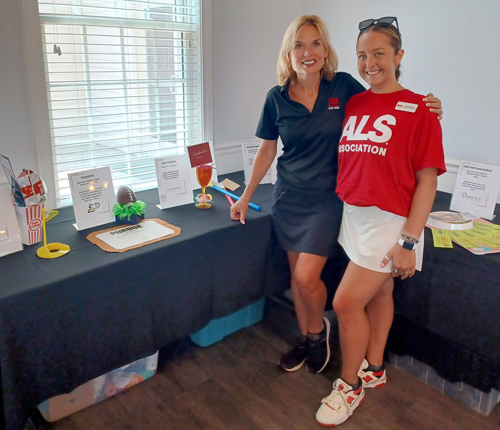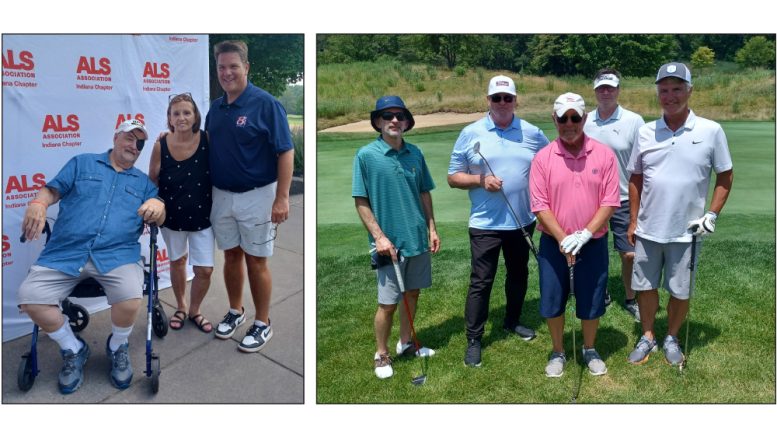By RICHIE HALL
NOBLESVILLE – There is progress and there is always hope.
Those are two messages from Monday’s 2024 Bob Kravitz ALS Golf Classic, which took place at Prairie View Golf Club in Carmel. The event featured golf, dinner and a silent auction, and ultimately raised over $70,000 for the Indiana Chapter of the ALS Association.
“It’s been incredible,” said Kravitz. “I’ve been so gratified and humbled by the fact that all of these celebrities and all of these golfers are willing to play and happy to play and give money to this great, great cause.”
Kravitz, a long-time Indianapolis sports journalist, began the tournament in 2012. The tournament is in memory of Kravitz’s mother Edith, who passed away due to ALS in 2007.
“It’s in memory of her, it’s in memory of my father Richard, who was a wonderful caretaker to my mother through the five or six years that she dealt with it,” said Kravitz.
ALS (amyotrophic lateral sclerosis) is a progressive motor neuron disease for which there is no cure. While progression of the disease varies among each individual, it causes them to lose their ability to walk, talk, swallow and eventually breathe. The tournament brings together golf lovers, local celebrities, community leaders and philanthropists, who united to raise awareness and raise money to help Indiana ALS patients and their families.
Kravitz said that in 2012, “ALS reached out to me and asked me if I’d like to be involved in doing something. I told them that I’ve always wanted to have a golf tournament because I love golf. I’m addicted. It just seemed like a good way to raise money. You get the local community involved.”
In addition to those participating in the golf tournament, ALS patients were also at Prairie View. One of them was Bruce Timberman and his wife Mary. Bruce was diagnosed with ALS in 1983 at the age of 36.
“The type that I have is very slow progressing,” said Bruce Timberman. “It’s just the last year where it’s attacked me a little more and I’m starting to lose the strength in my legs and I got a lot of tremors in my hand.”
“You can’t compare an ALS patient to another,” said Mary Timberman. “And that’s the hard part because, you can’t find a cause, so you can’t find a cure. With so many different things going on with different people, it’s really hard. But they’re working really hard at trying to find a cause, so they can find a cure.”

Mona Euler (left, Chair of ALS Leadership Council) and Olivia Smith (development coordinator) stand next to some of the silent auction items that were up for bid at the Golf Classic. Items included tickets to a Purdue football game, and events at Cooper’s Hawk Winery and the Indianapolis Symphony Orchestra. (Richie Hall)
The Timbermans are originally from the Chicagoland area; Bruce Timberman was working at U.S. Steel in Gary when he was diagnosed. He worked three more years, then retired on disability in 1986.
“Since ’86, I’ve not been doing a lot of stressful stuff,” said Bruce Timberman. “I’ve been able to get out and enjoy myself. Because of this, I have witnessed so much. My three grandkids, I was there when they were born.”
Bruce was able to see his grandchildren graduate high school and has seen the oldest two graduate college. Bruce’s youngest grandchild is a junior at Indiana University. “I hopefully get to see him graduate in two years,” he said.
When Bruce Timberman was first diagnosed, he received help from the Les Turner ALS Foundation, which is based in the Chicago area. The Timbermans moved to the Indianapolis area in 1997 – they live in Fishers – and became involved with the ALS Association.
“They’ve done a lot of stuff for me, helped me get things that I need,” said Bruce. He and Mary give back to the organization by coming to events like the Bob Kravitz Golf Classic to volunteer. The Timbermans will also attend the Walk to Defeat ALS Indiana, which takes place Sept. 21 at the State Fairgrounds.
“We just like to be a part of this, because they’ve been so good to us,” said Bruce.
Bruce Timberman believes there has been progress in finding a cure for ALS. He has been asked to participate in drug studies, but although he said yes, he would be told his condition wasn’t bad enough to be a part of the tests.
“But I keep an eye on it and see what’s going on with it,” said Bruce Timberman. “They’re coming up with a lot of stuff.”
“We are getting closer,” said Kravitz. “I would be lying to you if I said I follow it super close, but we’re making progress. At this point, what we’re trying to do is make life for those afflicted more palatable, more pleasant, such as it is. We’re making progress, but we’re not quite there. You see what’s going on with Alzheimer’s. They’re starting to find ways to reverse that. We hope that impacts ALS.”
For more information on the ALS Association, visit www.als.org.

